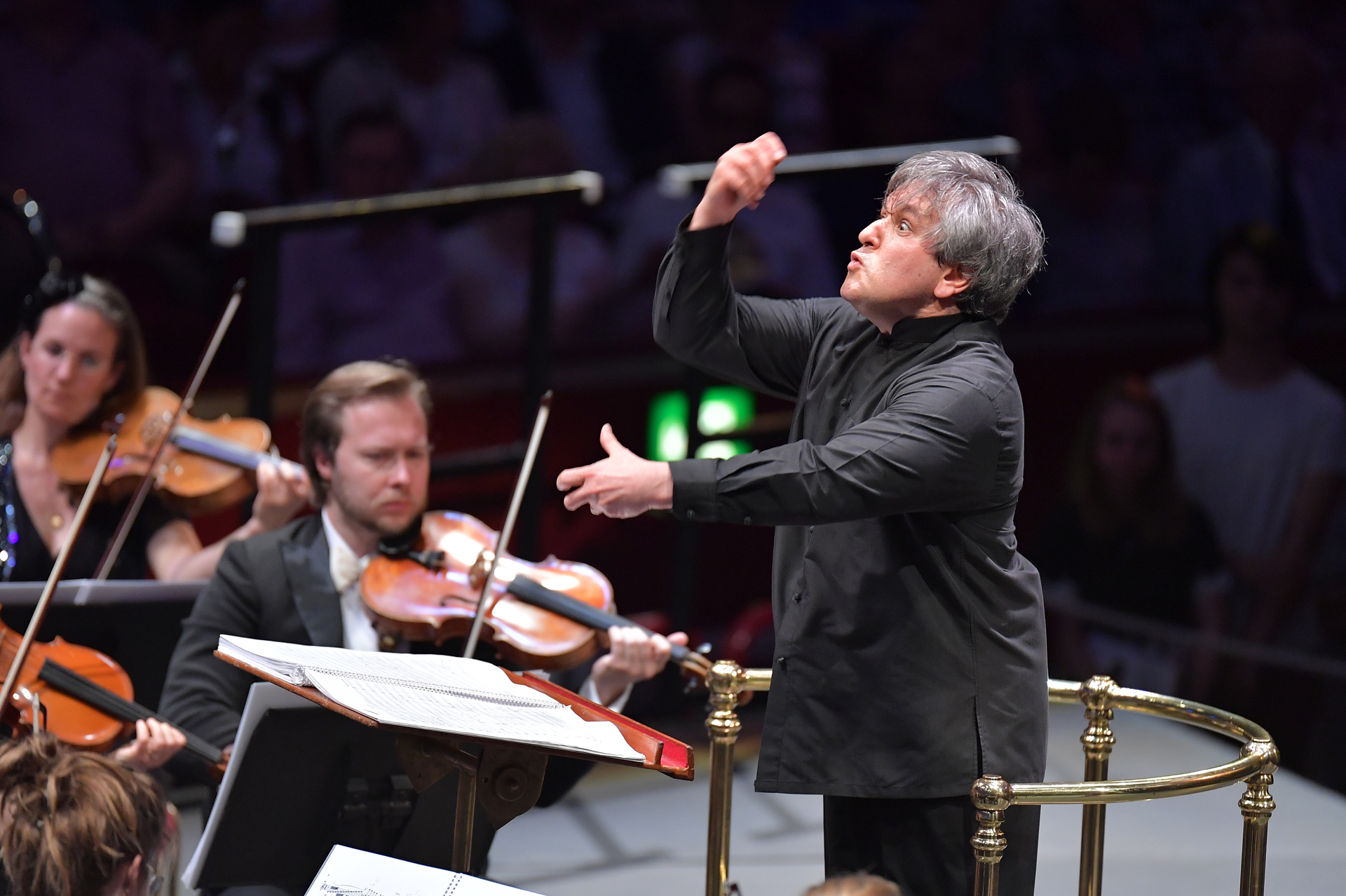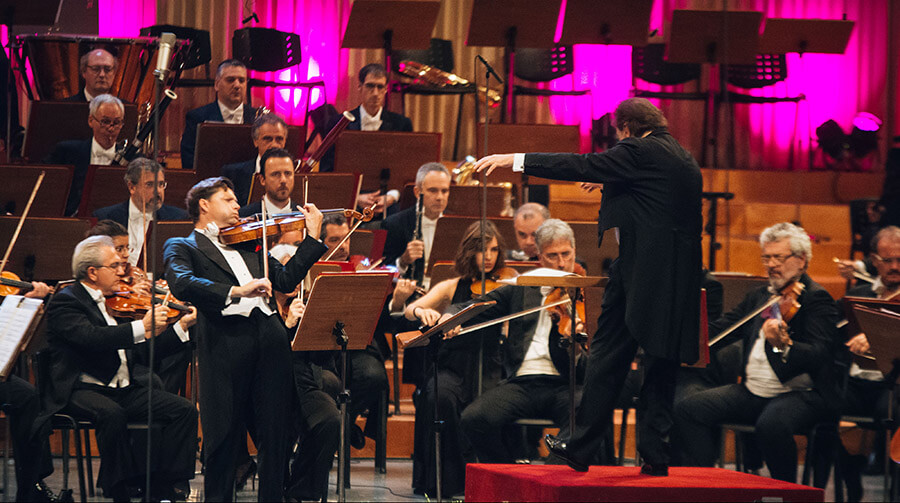Boris Godunov M. Mussorgsky Saturday 16 July 2016 Prom 2

Have concert performances of operas become better and more popular over the last decade or have I just learned to appreciate them?
The original 1869 version of Mussorgsky’s Boris Godunov is in many ways ideally suited to the concert stage as it is not too long – just over two hours, as opposed to the 1872 versions that can easily be an hour longer. Another reason why the concert platform suits this opera in four parts is the fact that there is very little dramatic interaction between the main characters. So one could argue that not a lot is lost without a full-on theatrical staging. The real tragedy is poured out in the Tsar’s internal monologues. Quite honestly, sometimes it is good to just focus on the singing and orchestra without the clutter. Yes, I always think it is a little bit sad when too much focus is on the staging and the stage director, but that is another discussion. We do miss out on some of the big chorus scenes that certainly would have added some visual distraction, but on the other hand we get an opportunity to watch the orchestra and conductor in action. And Sir Antonio Pappano is entertaining to observe – he certainly has very communicative eyes . He has now been 14 years at the helm of the Orchestra of the Royal Opera House and they read him like a book .

It was helpful that the cast members wore the costumes from the original Royal Opera House production. The Royal Opera Chorus members, on the other hand, wore black and were positioned behind the orchestra.
Do we gain anything from a concert performance? I didn’t see the production at Covent Garden earlier this year, but I think the singers can have a greater immediate rapport with the audience because the orchestra is placed behind them. The performers don’t have to bridge the gap of the orchestra pit – the audience is in their face and, vice versa, the singers can see the faces of the spectators. Bryn Terfel made use of that proximity to the standing prommers in front of the stage.
I am not familiar with Alexander Pushkin’s original play, but Mussorgsky, who adapted the libretto himself, didn’t change many, if any words. But he did he cut large chunks of text and orchestrated his first version within eight months. (in 1872 he made a second, much longer version and after Mussorgsky’s death Rimsky-Korsakov re-orchestrated the whole piece).
Pushkin shows very little sympathy for Tsar Boris and blames him for the murder of Ivan the Terrible’s young son, the Tsarevich Dmitry. The crowd consisting of “urchins, vagabonds and people of Moscow” are no better. They are a perfidious bunch and described as a “flock of sheep” (in the words of a police officer). They are berated, bullied and ordered to sing hymns of praise and wail for the new Tsar at the Kremlin.
No wonder that the Russian censor wasn’t happy with the opera. Tsar Nicolas I had issued a decree 30 years earlier that Imperial rulers could not be represented on stage. It didn’t help that the crowd also seemed rather rebellious, which could put revolutionary ideas into people’s heads.

Tsar Godunov (Bryn Terfel) makes his first entrance dressed in his golden Coronation Robe, while the bells are pealing. Despite being positioned in the upper gallery of the Albert Hall, the bells can easily drown out the singers, if you are not careful. Terfel commands the stage with ease, but the potentate he plays is ill at ease and we can feel the foreboding mood when he leaves to participate in the festivities.
The next scene takes place at the monastery five years later. Pimen (Ain Anger) is working on a chronicle of Russia. He tells his pupil, the novice Grigory about his wild youth, when he fought in Kazan and Lithuania and served at the court of Tsar Ivan. Godunov is a regicide, he murdered the Tsarevich, according to Pimen. He tells Grigory that Dmitry would have been his age, if he were still alive. This is when Grigory realises that he could pretend to be the resurrected Dmitry. Already in the next scene Grigory (David Butt Philip) has assumed the role as the pretender Dmitry and is trying to get across the border to Lithuania.

John Graham-Hall as the devious Prince Shuisky is magnificently sly and his light tenor is very malleable. Godunov swallows whole Shuisky’s lies about the Tsarevich’s uncorrupted body at the funeral. Terfel is genuinely moving when portraying the by guilt tormented Tsar. He has visions of the bloodstained infant Dmitry he murdered and begs for God’s mercy.
We get reports about the Pretender’s militairy progress and the wily Shuisky informs the boyars about the Tsar’s precarious mental state. When Boris reappears he is barefoot and looking dishevelled but still manages to address the boyars. Then Shuisky introduces his ’witness’ , the monk Pimen to the assembled aristocrats. It is his testimony about a miracle involving Dmitry that puts the final nail in the Tsar’s coffin.
There is a fair amount of Shakespearean influence and Pushkin’s even resorted to iambic pentameter in some of the Tsar’s monologues. But dramatically Mussorgsky’s first version of Boris Godunov is quite weak and confusing. We never see Grigory after he becomes the Pretender. The three female parts are very short and hardly satisfying. The role of the Simpleton, in this production with a bucket on his head, is frustrating rather than echoing King Lear. In the second version the Simpleton’s role is more developed.
But it doesn’t really matter. It is the brooding, at times intensely dark music that males this such a listenable and watchable experience.
Bryn Terfel is a dramatic high bass and true Slavic low basses are rare. But the Welshman is a good actor, tall and broad shouldered and therefore visually also ideally suited for the role. The ‘real’ bass role is reserved for the monk Pimen, sung by the Estonian Ain Anger. He has a very pleasant voice but I think it can benefit from gaining even more richness. For reference listen to great Finnish bass Martti Talvela.
There were no weak links and a special mention should go to the double act Missail (Harry Nicoll) and Varlaam (Andrii Goniukov). Nicoll turned out to be a very accomplished accompanist on spoons!!
The Royal Opera Chorus did not participate in the acting , but perhaps they sang even better because they could concentrate fully on the score. And need I say anything more about Pappano and ‘his’ Royal Opera Orchestra? That combination will never let you down.
If you live in the UK you can listen to the opera here (until the third week of August):
http://www.bbc.co.uk/programmes/b07jlkdz/clips


